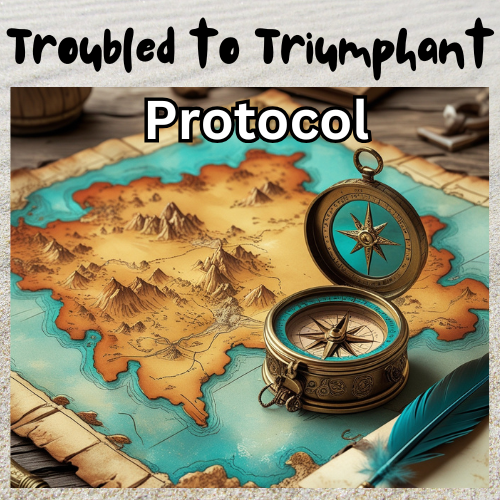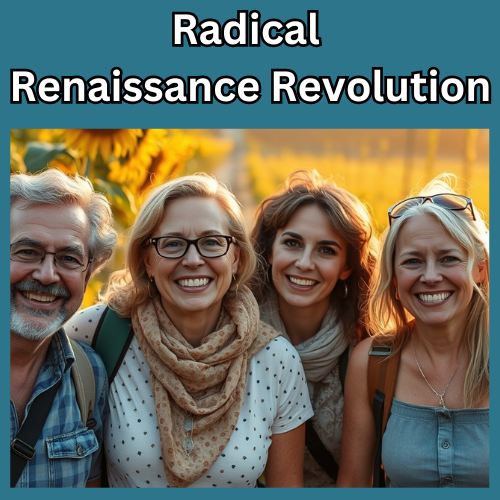Learn the Lessons, Celebrate the Victories, and Let Go of the Past
Introduction: The Weight of Yesterday
Life is a series of transitions. Some new beginnings we welcome with open arms—new jobs, relationships, and opportunities. Others catch us off guard—loss, failure, unexpected change. But whether we initiate them or not, every transition requires one thing: letting go of the past to embrace the future.
Imagine a gardener who refuses to uproot dead plants, clinging to last season’s withered blooms. The soil grows barren, and new seeds suffocate under the debris. This is what happens when we cling to the past.
I once worked with a client—let’s call her Sarah—a high-powered lawyer who felt trapped in a cycle of resentment after a bitter divorce. She replayed old arguments like a broken record, convinced her best days were behind her. Then, during a coaching session, she asked a revolutionary question: “What if my pain is just fertilizer for something better?” Sarah’s shift—from victim to visionary—didn’t happen overnight.
Yet, letting go isn’t as simple as flipping a switch. It’s an emotional, psychological, and even physiological process. We cling to what we know, even when it no longer serves us. Why? Because the past feels familiar. Safe. Even when it hurts.
What if your next beginning—your next chapter—is waiting for you just beyond the clutter of yesterday’s regrets, wounds, or even successes? The key to unlocking it? Learn the lessons. Celebrate the victories. Let go.
Let’s explore how you can do this, not just conceptually, but practically—so you can till the soil of your life for a harvest of new possibilities. And if you’re ready to dig deeper?
Step 1: Learn the Lessons
Every experience, good or bad, carries a lesson. The problem? We often refuse to acknowledge the hard ones. We distract ourselves. We blame others. We numb the pain.
But ignoring the lesson ensures we’ll repeat the mistake.
Take Emma, a client who joined one of my From Troubled to Triumphant retreats. She had just ended a 10-year relationship, devastated and angry. “I wasted a decade,” she said. But as we worked through her past, she realised something profound: she had silenced her own needs to please someone else for 10 years. That was the real lesson. And until she absorbed it, she’d likely attract the same dynamic again.
Or James, a musician who bombed his first solo performance and then enrolled in the iNFINITE iMPACT Mentoring Program. Instead of quitting, he analysed every off-key note. Two years later, he headlined a sold-out show. “That disaster was my best teacher,” he told me.
How to Extract the Lessons from Your Past – Actionable Steps:
- Reflective Journaling: Each night, write one lesson learned—even from mundane moments. (“Today, I learned interruptions are invitations to practice patience.”)
- The Feedback Feast: Ask three trusted people: “What’s one pattern you see holding me back?” (Warning: Chew the meat; spit out the bones.)
- Mindful Mining: When regret arises, ask: “What’s here to teach me?” (No lesson? Toss the thought like junk mail.)
- Different Perspectives – Sometimes we’re too close to see our blind spots. A mentor, coach, or trusted friend can offer insight.
- Accept the Discomfort – Learning isn’t always pleasant. It often requires sitting with uncomfortable truths, but doing so paves the way for true transformation.
“And once the storm is over, you won’t remember how you made it through, how you managed to survive. You won’t even be sure, whether the storm is really over. But one thing is certain. When you come out of the storm, you won’t be the same person who walked in. That’s what this storm’s all about.” ― Haruki Murakami
Key takeaway: Life will keep teaching you the same lesson until you learn it. Be a student, not a prisoner of your past.
Step 2: Celebrate the Victories
Society glorifies hustle culture. We’re told to “stay hungry,” but never to savour the meal. Bad advice.
We dwell on what went wrong but minimise what went right.
This is dangerous.
When we don’t celebrate our wins, we train our brains to focus on failures. We create an internal narrative that we’re never good enough. This kills momentum, confidence, and motivation.
Sam, another retreat participant, had built a successful business from scratch, but she kept comparing herself to others. Instead of celebrating the fact that she was financially independent and doing work she loved, she obsessed over getting better. This mindset exhausted her. Once she started celebrating small wins, everything changed—she found joy in the journey, not just the destination.
Teresa Amabile’s Progress Principle found that small wins boost motivation and creativity more than monetary rewards. NASA engineers, for instance, celebrate minor milestones during Mars missions—like successfully deploying a rover’s antenna. If it works for interplanetary exploration, it’ll work for you.
I mentored a CEO who dismissed a $1M deal as “luck.” When I pressed him to celebrate, he took his team to a pizza food truck. The result? A 30% spike in productivity. “Turns out pepperoni is a better motivator than pep talks,” he joked.
How to Honour Your Accomplishments – Actionable Steps:
- Share the Spark: Text a friend: “I did [X]. Let’s toast it tonight!” Talk about your wins. Not in arrogance, but in gratitude. It reinforces progress.
- The Victory Log: Track daily wins. (“Sent the email.” “Walked 10 minutes.”) Revisit it monthly. (Spoiler: You’re crushing it.) Don’t wait for massive success. Toast to the little victories, too.
- Ritualise It: Light a candle. Dance to ABBA. (No audience required.)
- Surround Yourself with Positive Reinforcement – spend time with people who uplift and encourage you, and return the favour.
Key takeaway: Recognising your victories fuels your belief in yourself, which fuels your ability to move forward.
Step 3: Let Go
This is the hardest part.
We hold onto grudges, regrets, and even outdated versions of ourselves. But you can’t carry the weight of your past and reach for your future at the same time.
Let’s debunk a myth: Letting go isn’t about pretending the past didn’t hurt. It’s about rewiring your brain to stop reliving it.
Take Mark, who struggled to forgive his father for a childhood of neglect. “If I forgive him, it’s like saying what he did was okay,” he said. But that’s not what forgiveness is.
Forgiveness is about liberating yourself from the emotional baggage that’s holding you hostage. When Mark finally let go—not for his father, but for himself—he felt a weight lift. He described it as breathing deeply for the first time in years.
Neuroscience shows that rumination (obsessive overthinking) strengthens neural pathways tied to pain, while mindfulness weakens them. Think of your mind as a Netflix algorithm: The more you replay the “heartbreak horror story,” the more it recommends the sequels.
I worked with Elena, who clung to a decade-old betrayal. During a mentoring exercise, she wrote her ex-partner’s name on a helium balloon and released it. “It wasn’t forgiveness,” she said. “It was a declaration that his rent-free stay in my head was over.”
How to Let Go and Move Forward – Actionable Steps:
- Symbolic Release: Burn their letters. Delete old photos. Donate their sweater. (Note: Pyrotechnics optional.)
- Cognitive Defusion: When a toxic thought arises, label it: “Ah, there’s the ‘I’m not enough’ story again.” Watch it fade like a deflating balloon.
- Gratitude Alchemy: Replace “I lost X” with “I gained Y.” (Example: “I gained self-respect when I left.”)
- Write a Goodbye Letter – Whether it’s to a person, a past self, or an event, write it all out. Then destroy the letter. Symbolism is powerful.
- Visualize Your Future Self – Close your eyes. Picture the person you’re becoming. What do they no longer carry? Now, embody that.
- Replace Old Stories with Empowering Ones – Identify limiting beliefs and actively reframe them to support your new chapter.
“It hurts to let go, to say goodbye for the final time and remain distant in your closure, it may even tear your heart out to the point of insanity; but somehow in it all you find the pieces of your worth and you start creating yourself again, and in that journey of transformation you find the essence of what truly matters, inner happiness. It’s life, we all fall at some stage but it’s up to you, to decide how long you want to stay there.” ― Nikki Rowe
Key takeaway: Letting go is not erasing the past; it’s reclaiming your future.
If You want to help a Friend
Dealing with past pain is never easy, so well done to you for wanting to help! Here are some suggestions that might make a difference:
- First, let them really feel what they’re feeling. No brushing it off, no “get over it.” Just acknowledge, “Yeah, this sucks,” and let them cry, vent, whatever they need. Maybe journaling can help them untangle the messiest emotions.
- Mindfulness can be a game-changer. Think of it as hitting the “pause” button when their past and future worries become overwhelming. Even just a few minutes of focused breathing can bring them back to right now.
- Self-compassion is helping HUGE. Show them how to be as kind to themselves as they’d be to anyone else. We’re all a bit rough on ourselves sometimes. Encourage them to replace those nasty self-critical thoughts with something gentler. Like, “I messed up, but I’m doing the best I can.”
- Distance is sometimes needed. This might mean less time with people who remind them of the pain or skipping places that bring back hurtful memories.
- Boundaries are non-negotiable. Learning to say “no” without feeling guilty is a secret weapon. If something or someone is draining their energy, it’s okay to help them create some space.
- Forgiveness is complex and personal. It doesn’t mean saying what happened was okay. It’s more about letting go of the anger and resentment that’s weighing them down. This is a slow process, can’t be rushed.
- Support can change everything. Therapy can be incredibly helpful. A good therapist/coach/mentor is like a guide through the darkness. If therapy feels too intense, even a support group where they can talk to others who understand can be amazing.
- Self-care isn’t selfish. Remind them to do things that bring them joy – a hot bath, listening to music, going for a walk in nature, anything that recharges their batteries.
- Changing perspective can empower. Instead of dwelling on the negative, try to find the lesson learned or even just something they’re grateful for. It sounds cheesy, but it can totally shift their focus.
- Focus on the future! What do they want their life to look like? Setting goals, even small ones, can give them something to look forward to and a sense of purpose.
“Even if you cannot change all the people around you, you can change the people you choose to be around. Life is too short to waste your time on people who don’t respect, appreciate, and value you. Spend your life with people who make you smile, laugh, and feel loved.”― Roy T. Bennet
The biggest thing to remember is that healing takes time. Be patient, be supportive, and remind them that they’re not alone. Just being there to listen without judgment can make a world of difference.
The Next Step
This process—learning, celebrating, releasing—is what creates space for powerful new beginnings. But you don’t have to do it alone.
That’s why I created From Troubled to Triumphant—a transformational Camino de Santiago walking retreat designed to guide you (or your friend) through this process, step by step. In a supportive, immersive environment, you’ll:
✅ Identify and heal from past wounds
✅ Rebuild confidence and clarity
✅ Develop a concrete plan for your next chapter
✅ Connect with like-minded individuals who understand your journey
And most importantly—you’ll leave with the tools to keep growing, thriving, and stepping into the life you were meant to live.
Your next chapter is waiting. The only question is: Are you ready for it?
Join us. Let’s turn your past into power and your pain into purpose.
Learn more about From Troubled to Triumphant here.

“I am an experienced medical doctor – MBChB, MRCGP, NLP master pract cert, Transformational Life Coach (dip.) Life Story Coach (cert.) Stress Counselling (cert.) Med Hypnotherapy (dip.) and EAGALA (cert.) I may have an impressive number of letters after my name, and more than three decades of professional experience, but what qualifies me to excel at what I do is my intuitive understanding of my clients’ difficulties and my extensive personal experience of managing major life changes using strategies I developed over many years.” Dr M Montagu
Hit the pause button and regain your footing during a From Troubled to Triumphant Retreat. Imagine walking a peaceful stretch of the Camino de Santiago, where every step helps untangle the mental clutter or spending time with gentle Friesian horses who teach you the art of mindfulness. Whether you choose to make a change or are forced to, this retreat offers the perfect blend of peace, perspective, and playful exploration to help you rise from troubled to triumphant!


Ready to start again, stronger than ever before? This quiz will help you find out. It is not just about measuring where you are right now; it’s about shining a light on the areas of your life that feel meaningful, as well as those that might need attention. It’s an opportunity to reflect, recalibrate, and take steps toward a life that’s not only successful but profoundly fulfilling. Take The Quiz















